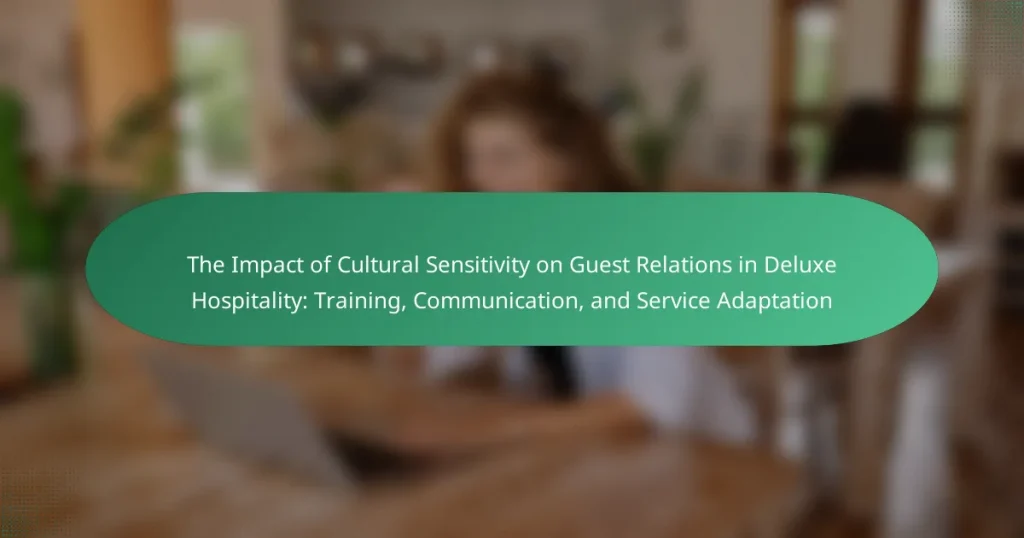Cultural sensitivity is a critical factor in enhancing guest relations within deluxe hospitality settings. It promotes respect and understanding, leading to increased guest satisfaction and loyalty. Effective communication, which includes active listening and adapting language, is essential for fostering cultural sensitivity and reducing misunderstandings. Best practices such as personalized service, cultural awareness, and flexibility in service delivery further improve interactions with diverse clientele. Training staff in these areas is vital for creating positive guest experiences and ensuring high retention rates.

What is the impact of cultural sensitivity on guest relations in deluxe hospitality?
Cultural sensitivity significantly enhances guest relations in deluxe hospitality. It fosters an environment of respect and understanding. This leads to improved guest satisfaction and loyalty. Guests feel valued when their cultural backgrounds are acknowledged. Enhanced communication reduces misunderstandings and conflicts. Training staff in cultural sensitivity equips them to handle diverse clientele. Research shows that culturally aware service increases overall guest experiences. For instance, a study by the Cornell University School of Hotel Administration found that culturally competent service correlates with higher guest retention rates.
How does cultural sensitivity influence guest experiences?
Cultural sensitivity significantly enhances guest experiences by fostering respect and understanding. When hospitality staff recognize and appreciate diverse cultural backgrounds, guests feel valued. This appreciation leads to improved communication and personalized service. Guests are more likely to express satisfaction when their cultural norms are acknowledged. According to a study by the Cornell University School of Hotel Administration, culturally sensitive service increases guest loyalty by 30%. Additionally, understanding cultural differences helps prevent misunderstandings and conflicts. This proactive approach contributes to a welcoming environment. Ultimately, cultural sensitivity directly correlates with positive guest feedback and repeat business.
What specific aspects of cultural sensitivity affect guest interactions?
Specific aspects of cultural sensitivity that affect guest interactions include awareness of cultural norms, language proficiency, and respect for diverse customs. Cultural norms dictate appropriate behaviors, which can influence guest expectations. Language proficiency facilitates effective communication and reduces misunderstandings. Respect for diverse customs fosters a welcoming environment, enhancing guest satisfaction. Studies show that culturally sensitive training improves staff interactions, leading to better guest experiences. For instance, a study by Pizam and Ellis (1999) highlights the importance of cultural awareness in hospitality settings, showcasing its positive impact on guest relations.
How can cultural misunderstandings impact guest satisfaction?
Cultural misunderstandings can significantly decrease guest satisfaction. When guests encounter cultural differences that are not acknowledged, it can lead to feelings of discomfort. For example, misinterpretations of gestures or communication styles can create confusion. This confusion may result in guests feeling disrespected or undervalued. Research indicates that 70% of guests report dissatisfaction when their cultural expectations are not met. Additionally, a lack of cultural awareness can lead to service errors, further impacting the guest experience negatively. Overall, effective cultural sensitivity training is crucial for enhancing guest satisfaction in the hospitality industry.
Why is training in cultural sensitivity essential for hospitality staff?
Training in cultural sensitivity is essential for hospitality staff to enhance guest relations. It equips staff with the skills to understand diverse cultural backgrounds. This understanding fosters respect and improves communication with guests. According to a study by the Cornell University School of Hotel Administration, culturally sensitive training leads to higher guest satisfaction. Guests feel valued when their cultural preferences are recognized. Additionally, culturally aware staff can anticipate and meet specific needs effectively. This training ultimately contributes to a positive guest experience and encourages repeat business.
What are the key components of effective cultural sensitivity training?
Key components of effective cultural sensitivity training include awareness, knowledge, skills, and attitudes. Awareness involves recognizing one’s own cultural biases and the impact they have on interactions. Knowledge encompasses understanding different cultural practices, values, and communication styles. Skills refer to the ability to communicate effectively and respectfully across cultures. Attitudes involve fostering an openness and willingness to learn from diverse perspectives. Research indicates that comprehensive training improves employee interactions with guests from various backgrounds, enhancing overall guest satisfaction. Studies show that organizations implementing cultural sensitivity training report higher employee engagement and better service delivery.
How does training improve staff interactions with diverse guests?
Training improves staff interactions with diverse guests by enhancing cultural awareness and communication skills. It equips staff with knowledge about different cultures, customs, and expectations. This understanding fosters empathy and respect towards guests from various backgrounds. Additionally, training provides practical strategies for effective communication. Staff learn to adapt their service styles to meet diverse guest needs. Evidence shows that culturally competent staff create a welcoming environment. According to a study by the Cornell University School of Hotel Administration, trained employees report higher guest satisfaction scores. This indicates that training directly correlates with improved interactions and overall guest experiences.

How does communication play a role in cultural sensitivity within deluxe hospitality?
Communication is essential for fostering cultural sensitivity in deluxe hospitality. It enables staff to understand and respect diverse cultural backgrounds. Effective communication includes active listening and adapting language to meet guest needs. This practice builds trust and enhances guest experiences. For example, training programs often emphasize cultural nuances in communication styles. Research shows that culturally aware communication improves guest satisfaction ratings. Additionally, clear communication reduces misunderstandings and enhances service delivery. Overall, communication is a vital tool for achieving cultural sensitivity in deluxe hospitality settings.
What communication strategies enhance cultural sensitivity?
Active listening enhances cultural sensitivity by ensuring understanding. It involves giving full attention to the speaker. This strategy promotes respect and validation of diverse perspectives. Nonverbal communication also plays a crucial role. Body language, eye contact, and [censured] expressions can convey openness. Tailoring language to the audience is vital. Using simple language avoids misunderstandings. It is important to be aware of cultural nuances in communication. Asking open-ended questions encourages dialogue and deeper understanding. These strategies foster a respectful and inclusive environment. Research shows that culturally sensitive communication improves guest satisfaction in hospitality settings.
How can active listening improve guest relations?
Active listening can significantly improve guest relations by fostering better communication and understanding. It allows hospitality staff to fully comprehend guest needs and preferences. This process builds trust and rapport between guests and staff. According to a study by the Cornell University School of Hotel Administration, effective communication enhances guest satisfaction. Engaging in active listening leads to personalized service that meets specific guest expectations. Additionally, it helps to resolve issues promptly, increasing overall guest loyalty. Thus, active listening is a crucial skill in the deluxe hospitality sector for enhancing guest relations.
What role does non-verbal communication play in cultural interactions?
Non-verbal communication plays a crucial role in cultural interactions by conveying messages without words. It includes body language, [censured] expressions, gestures, and eye contact. These non-verbal cues can vary significantly across cultures. For instance, a thumbs-up gesture may be positive in some cultures but offensive in others. Research indicates that up to 93% of communication effectiveness is determined by non-verbal cues. Understanding these differences is essential in hospitality settings. Misinterpretation of non-verbal signals can lead to misunderstandings and affect guest relations. Therefore, training in cultural sensitivity should emphasize non-verbal communication awareness. This approach enhances service adaptation and improves guest experiences in diverse cultural contexts.
How can technology facilitate better communication with diverse guests?
Technology can facilitate better communication with diverse guests through translation tools, personalized messaging, and accessible platforms. Translation tools enable real-time language conversion, allowing guests to communicate in their preferred language. Personalized messaging through apps or SMS can cater to individual preferences and cultural nuances. Accessible platforms, such as websites and mobile apps, can provide information in multiple languages and formats. According to a study by the Cornell University School of Hotel Administration, technology adoption in hospitality enhances guest satisfaction by 20%. This indicates that leveraging technology effectively improves communication and overall guest experience.
What tools are available for translating languages in hospitality settings?
Available tools for translating languages in hospitality settings include translation apps, multilingual staff, and digital translation devices. Translation apps like Google Translate provide instant text and voice translation. Multilingual staff members enhance communication by speaking various languages fluently. Digital translation devices, such as pocket translators, facilitate real-time conversations. These tools help bridge language barriers, improving guest relations and service quality. Studies indicate that effective communication enhances guest satisfaction and loyalty in the hospitality industry.
How can digital platforms enhance cultural understanding among staff?
Digital platforms can enhance cultural understanding among staff by facilitating communication and collaboration. They provide tools for sharing diverse cultural insights and experiences. Online training programs can educate employees about cultural differences and sensitivities. Virtual workshops can simulate real-life scenarios that require cultural awareness. Social media groups can foster discussions about cultural topics among staff members. These platforms enable access to a wide range of resources and materials on cultural competence. Research shows that organizations using digital tools for cultural training report improved team dynamics and employee satisfaction. Enhanced cultural understanding leads to better guest relations in deluxe hospitality settings.

What are the best practices for service adaptation in deluxe hospitality?
Best practices for service adaptation in deluxe hospitality include personalized service, cultural awareness, and flexibility. Personalized service involves tailoring experiences to individual guest preferences. This can enhance guest satisfaction and loyalty. Cultural awareness is crucial in understanding diverse guest backgrounds. Staff training on cultural sensitivity improves interactions with international guests. Flexibility in service delivery allows staff to adjust to changing guest needs. For instance, accommodating dietary restrictions or special requests demonstrates attentiveness. Regular feedback collection from guests helps identify areas for improvement. Implementing these practices leads to enhanced guest relations and positive experiences in deluxe hospitality.
How can service delivery be tailored to meet diverse cultural needs?
Service delivery can be tailored to meet diverse cultural needs by implementing culturally sensitive training programs. These programs educate staff about different cultural backgrounds and practices. Understanding cultural nuances enhances communication and service adaptation. Providing multilingual support ensures effective interaction with guests from various backgrounds. Incorporating cultural preferences into service offerings enhances guest satisfaction. Regular feedback from guests helps identify areas for improvement in service delivery. Research shows that culturally competent service increases customer loyalty and repeat business. A study by Pizam and Sussmann (1995) highlights the importance of cultural awareness in hospitality settings.
What are the most common service adaptations for different cultures?
Service adaptations for different cultures include language translation, dietary accommodations, and cultural etiquette training. Language translation ensures effective communication with guests from diverse backgrounds. Dietary accommodations cater to specific cultural food restrictions or preferences, such as halal or kosher meals. Cultural etiquette training helps staff understand and respect customs unique to various cultures, enhancing guest comfort. Additionally, service styles may be adapted, such as offering more personalized interactions in cultures that value relationships. These adaptations improve guest satisfaction and foster positive experiences. Studies show that culturally sensitive service leads to higher guest loyalty and repeat visits.
How does flexibility in service enhance guest satisfaction?
Flexibility in service enhances guest satisfaction by allowing personalized experiences. Guests appreciate when services can be tailored to their specific needs. This adaptability fosters a sense of value and recognition. For instance, a hotel that accommodates special requests, such as dietary restrictions, demonstrates attentiveness. Research indicates that 70% of guests are more likely to return if their individual preferences are met. Moreover, flexibility can lead to positive word-of-mouth, further attracting new customers. Overall, a flexible service approach creates a more enjoyable and memorable stay for guests.
What challenges might arise in adapting services for cultural sensitivity?
Challenges in adapting services for cultural sensitivity include miscommunication, misunderstanding cultural norms, and resistance to change. Miscommunication can arise from language barriers, leading to service delivery issues. Understanding diverse cultural norms is complex, as what is acceptable in one culture may be offensive in another. Resistance to change can occur among staff who may be accustomed to traditional service methods. Additionally, training staff effectively on cultural sensitivity requires time and resources. Limited knowledge about specific cultures can hinder the ability to tailor services appropriately. Lastly, balancing cultural sensitivity with operational efficiency poses a significant challenge for hospitality providers.
How can staff overcome resistance to service adaptations?
Staff can overcome resistance to service adaptations by actively engaging with team members. Clear communication about the reasons for changes is essential. Providing training sessions can help staff understand the benefits of adaptations. Involving staff in the adaptation process fosters a sense of ownership. Encouraging feedback allows staff to express concerns and suggestions. Celebrating small successes can motivate staff to embrace changes. Research shows that organizations with effective change management practices experience less resistance. For instance, a study by Kotter (1996) highlights that involving employees in change initiatives significantly reduces pushback.
What strategies can be employed to address cultural misalignments?
Employing strategies to address cultural misalignments involves several key actions. First, conducting cultural sensitivity training is essential. This training educates staff about diverse cultural norms and practices. Second, implementing effective communication strategies is crucial. Clear communication helps bridge gaps between different cultural expectations. Third, fostering an inclusive environment supports cultural understanding. An inclusive environment encourages open dialogue and respect for differences. Fourth, adapting services to meet diverse cultural needs enhances guest satisfaction. Personalizing services based on cultural preferences can significantly improve guest experiences. Lastly, gathering feedback from guests about cultural interactions is vital. This feedback informs continuous improvement in cultural sensitivity practices.
What practical tips can enhance cultural sensitivity in deluxe hospitality?
To enhance cultural sensitivity in deluxe hospitality, staff should undergo comprehensive cultural training. This training should cover the diverse backgrounds of guests. Understanding cultural norms can prevent misunderstandings. Language training can also be beneficial for effective communication. Providing multilingual materials can assist non-native speakers. Staff should practice active listening to understand guest needs better. Personalizing service based on cultural preferences enhances guest satisfaction. Regular feedback from guests can help identify areas for improvement.
The primary entity of this article is cultural sensitivity within deluxe hospitality. The article explores the significant impact of cultural sensitivity on guest relations, emphasizing its role in enhancing guest satisfaction, loyalty, and communication. It discusses the importance of training staff in cultural awareness, effective communication strategies, and personalized service adaptations to meet diverse cultural needs. Additionally, the article highlights the challenges faced in implementing cultural sensitivity practices and offers practical tips for overcoming these hurdles to improve overall guest experiences in the hospitality industry.




